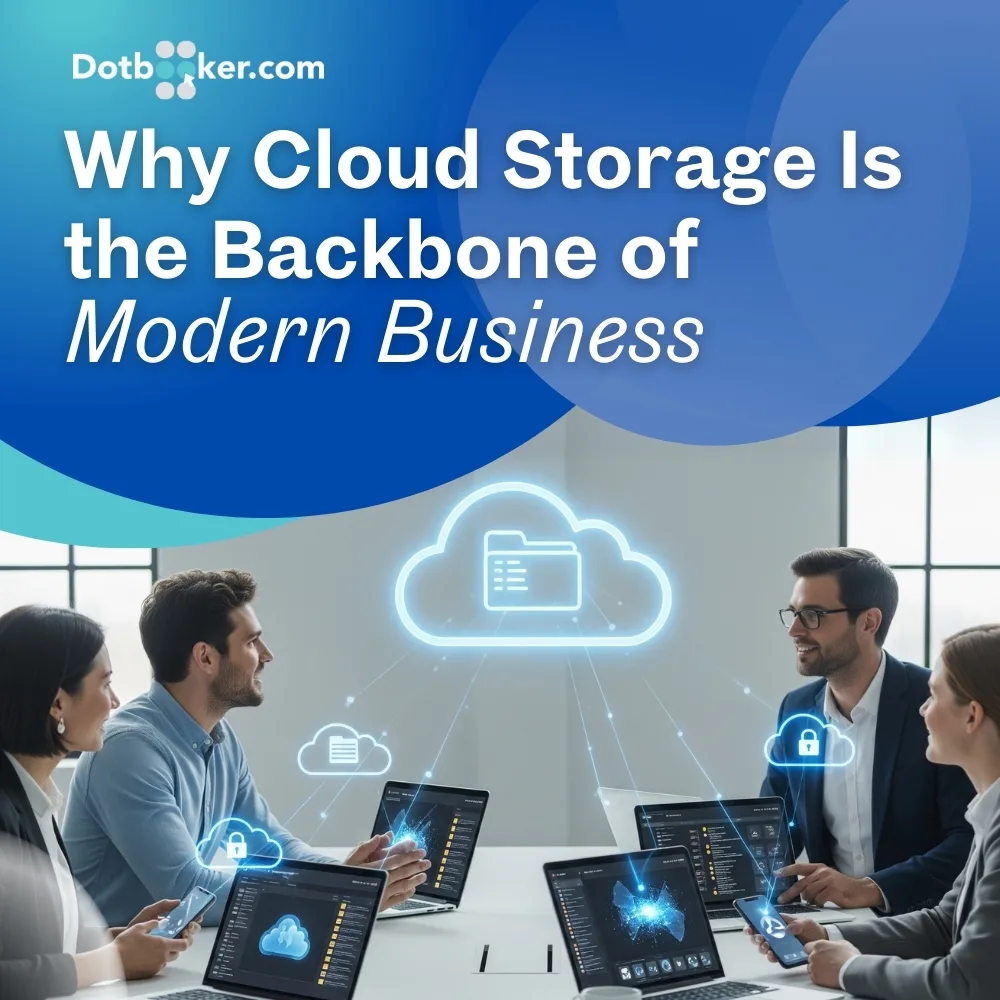
- By Dotbooker
- Sep 03, 2025
- 510
Why Cloud Storage Is the Backbone of Modern Business
Every business has a heartbeat. For some, it’s the ringing of cash registers; for others, it’s the hum of a manufacturing floor or the chatter in a sales office. But beneath all of it, there’s something far quieter—and far more critical—keeping everything running: data.
The way we store and access that data has changed forever. Cloud storage options are much more flexible than the large servers in secured rooms and paper trails in metal cabinets of the past. They are the unseen force that enables a company to function without limitations, bottlenecks, or downtime.
From Four Walls to a World Without Limits
In the past, "being at work" meant sitting at a desk in the same building as the data that your business kept. You were out of the loop if you weren't present. Files remained hidden in the company server, on desktop computers, or behind closed doors. You would have to scurry if a client called with a last-minute request while you were on the road, frequently depending on a colleague to retrieve the document and forward it.
Now, work isn’t defined by an address—it’s defined by access. With cloud-based storage for business, your office can be a coffee shop, a hotel lobby, or even a train seat on the way to a meeting. I need to pull up a sales contract for negotiation. It’s there in seconds. Reviewing architectural plans for a build-out? Just log in securely and you’re ready to go.
The real advantage isn’t just convenience—it’s agility. It’s the difference between making a decision in the moment and waiting days for the “right file” to travel across emails, approvals, and outdated systems. Businesses no longer lose momentum to physical limitations; they move at the speed their market demands.

From Physical Limits to Digital Freedom
A server room, which consisted of steel racks lined with humming machines, kept cool by a separate air conditioning unit, and guarded like a vault, was once the operational backbone of a business. Data access is required either physically sitting in the building or navigating strict VPN connections. This frequently resulted in lengthy wait times, sluggish file transfers, and ongoing version control concerns for anyone working remotely.
These days, cloud-based storage for companies knocks down those barriers. A design proposal saved last night can be displayed in a morning meeting across the world—without emailing massive attachments or risking outdated files. Urgent legal documents can be reviewed and signed securely from a home office at midnight, without IT’s intervention.
This shift has transformed business responsiveness. Instead of planning operations around data access, companies now shape their strategies knowing their information is always in reach—secure, updated, and ready to act on. That’s not just a technical upgrade; it’s an operational revolution.
Scalability: Growing Without the Growing Pains
Data needs fluctuate, sometimes doubling overnight, and don't always follow tidy, predictable trends. Conventional storage systems necessitate anticipating your needs, which results in the acquisition of expensive hardware "just in case." If you guess too high, resources will be wasted; if you guess too low, you run the risk of running out of space just when you need it most.
With cloud storage solutions, scalability is as simple as adjusting a setting. Storing a few hundred gigabytes now? That’s covered. Need to accommodate multiple terabytes because your creative team is producing high-resolution media or your analytics department is expanding customer data tracking? Just upgrade your plan—no downtime, no hardware delivery, no frantic IT calls.
For small and mid-sized businesses, access to the best cloud-based storage solutions means agility without financial strain. You pay for what you need when you need it, freeing budgets for growth rather than locking them into underused infrastructure.
Security That’s Proactive, Not Reactive
In the digital age, data is one of your most valuable assets—and one of the most targeted. Cybersecurity threats are constant, and the damage from a breach can be devastating, from legal consequences to permanent loss of customer trust.
High-quality cloud based storage for business flips the security model from passive defense to active prevention:
- Encryption at every stage – Your files are transformed into unreadable code during transfer and while stored, ensuring they’re useless to anyone without the right credentials.
- Multi-factor authentication – A password alone isn’t enough; additional verification steps make unauthorized access nearly impossible.
- Continuous monitoring – Advanced systems watch for unusual activity around the clock, catching threats before they escalate.
- Compliance-ready – Providers often meet strict international standards like HIPAA, SOC 2, and GDPR, giving you peace of mind that your business is aligned with best practices in data privacy.
Because of this proactive approach, your security is constantly active, constantly changing, and frequently stronger than anything you could keep up internally.
Collaboration That Feels Instant and Natural
Before the cloud, collaboration often felt like a relay race—passing files back and forth, hoping no one made changes to the wrong version, and losing precious time to endless email chains.
Now, cloud storage turns that relay into a shared workspace. Multiple team members can open the same document, make edits, add comments, and see updates in real time—whether they’re across the hall or across the globe. Marketing can refine imagery while sales updates pricing, and project managers can watch progress as it happens.
The result? Projects proceed without snags, decisions are made more quickly, and revisions are more understandable. This change promotes a more innovative, responsive, and connected workplace culture, while also saving time.
Resilience in the Face of the Unexpected
A hard drive crash. A natural disaster. An accidental deletion. In the old model, these events could erase critical data and bring operations to a standstill.
The stakes are completely altered by cloud storage. Files are automatically backed up to multiple, geographically dispersed data centers, ensuring that if one location fails, another takes over instantly. Teams can resume work without any delays as recovery times are reduced from days or weeks to just a few minutes.
For industries where downtime translates directly into lost revenue or damaged reputation, this resilience isn’t just a nice feature—it’s a lifeline.
The Integration Advantage
Today’s cloud platforms aren’t siloed—they’re central hubs that connect with the tools you already use to run your business.
- Your CRM can pull contracts directly from cloud storage without manual uploads.
- Accounting platforms can sync invoices and receipts instantly.
- Project management boards can link relevant documents so tasks have context at a click.
A smoother information flow, fewer steps, and fewer mistakes are all results of these integrations. It's about creating a networked business ecosystem that keeps teams in sync and operations lean, not just about storing files.
Cost Predictability and Budget Control
For many businesses, traditional storage is a financial guessing game. You might make an upfront investment in pricey servers and hard drives, only to discover after a year that they are underutilized or worse, outgrown, necessitating additional expensive purchases. Then there’s the unplanned expenses: hardware repairs, emergency replacements, software upgrades, and power consumption, all of which chip away at your budget.
With cloud storage solutions, you trade unpredictable capital expenditures for a predictable, subscription-based operational cost. You know exactly what you’ll spend each month, and you only pay for the storage you actually use. Need to expand during a busy season? Scale up for a few months and then scale down again without the financial sting of owning excess hardware.
This model also helps smaller businesses stay competitive without straining their budgets, giving them access to enterprise-grade technology that used to be available only to large corporations with deep pockets.
Automatic Updates and Zero Maintenance Overhead
On-premise storage might seem like a one-time investment, but maintaining it is a continuous drain on time, money, and manpower. Someone has to install security patches, update operating systems, replace faulty drives, and ensure backup protocols are running properly. Every update risks downtime, and every breakdown puts you in crisis mode.
With cloud-based storage for business, the maintenance burden shifts entirely to your provider. Automatic updates, which frequently go unnoticed, guarantee that your system is always running the newest security patches and performance improvements. Hardware malfunctions? Not your issue. Your team can focus on real business objectives instead of resolving technical problems, as your provider handles them in the background.
Version History and File Recovery
We’ve all been there—you open a document, make some changes, and save… only to realize you’ve just overwritten the wrong file. Or worse, someone deletes a critical report altogether. In traditional systems, recovering that file could be difficult or impossible without specialized IT intervention.
Modern cloud storage solutions solve this with robust version history features. Every time a file is edited, the system keeps a record of past versions. If something goes wrong, you can simply roll back to a previous iteration. Deleted a file by mistake? Restore it from the recycle bin or backup archive in seconds.
This safety net not only saves time and stress but also reduces the risk of costly errors—making it a quiet but powerful benefit for day-to-day operations.
Eco-Friendly and Energy Efficient
Not only are physical servers costly, but they also consume a lot of energy. They use a lot of electricity to run continuously, and specialized air conditioning systems are frequently needed to keep them cool. The impact on the environment and operating costs both rise as a result.
Leading cloud providers, on the other hand, run enormous energy-efficient data centers that are frequently powered by renewable energy sources. Energy use per business is significantly decreased as a result of resources being shared among several clients. Choosing cloud based storage for business isn’t just smart for your bottom line—it’s a step toward a more sustainable future, appealing to customers and stakeholders who value environmentally responsible practices.
Mobile-First Workflows
The business world has gone mobile, but traditional storage systems still assume you’re working from a desk. Accessing files remotely can be clunky, slow, or even impossible without specialized software and configurations.
Best cloud based storage for small business providers design their platforms with mobility in mind. Whether you’re uploading high-resolution images from a photo shoot, reviewing a proposal while commuting, or sharing updated project plans with a client in real time, the experience is seamless. The ability to work from any device, anywhere, means productivity isn’t tied to an office chair—it follows you wherever opportunity strikes.

Competitive Edge Through Agility
In fast-moving industries, being first often means being best. If it takes you days to access a file, update a project, or share data with a partner, you’re giving competitors a head start.
Cloud storage eliminates those delays. You can onboard new clients instantly, give your team access to the tools and data they need without setup delays, and respond to market changes in real time. This agility not only helps you win opportunities—it sends a clear message to clients and partners that your business is modern, efficient, and ready for anything.
Why the Future Belongs to the Cloud
Business success today hinges on the ability to adapt quickly, protect critical assets, and operate without unnecessary constraints. Cloud storage delivers on all three, offering a platform that grows with you, safeguards your work, and keeps your teams connected no matter where they are.
And for platforms like Dotbooker, which unify booking, client management, scheduling, and business analytics, cloud technology isn’t just a nice-to-have—it’s the infrastructure that makes the entire experience smooth, secure, and scalable. By embracing cloud solutions, businesses give themselves the agility and confidence to take on whatever the future brings.
Popular Blogs

- Oct 20, 2022
- 5071

- Sep 08, 2024
- 4467

- Nov 11, 2022
- 3866

- Sep 16, 2024
- 3154
Transform your business now!

Get an expert consultation for your business's streamlined operations.